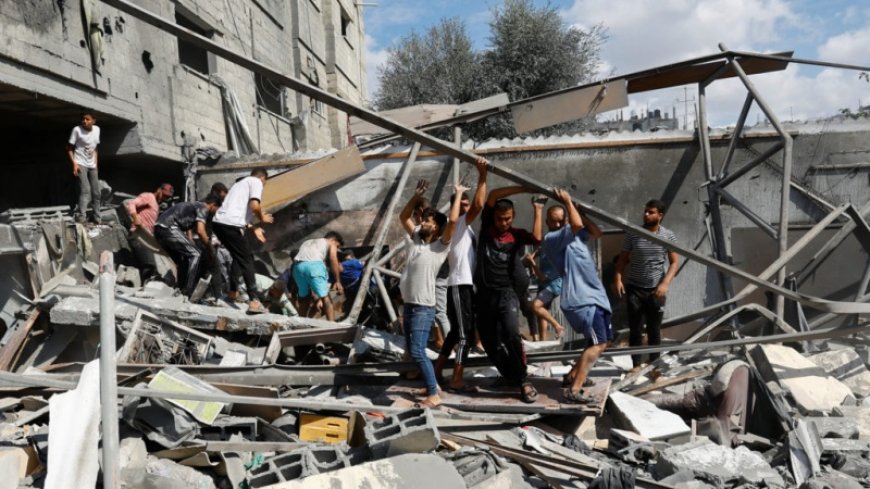Financial Times: Israel Confused about Attacking Rafah
The Financial Times newspaper reported that the Zionist regime currently has no specific plans to attack Rafah and they are confused.

The Financial Times quoted Israeli sources on Monday (12/2/2024) as reporting that although there is public talk about an imminent attack on Rafah, there are still no plans to start operations on Rafah. According to this informed source, Israel does not know what it wants to do and there is a lot of confusion in its decision regarding the attack on Rafah. Meanwhile; The Director General of the World Health Organization (WHO), Tedros Adhanom Ghebreyesus, on Sunday evening called reports of a possible Zionist regime attack on Rafah very worrying, and stressed that any Israeli attack on Rafah would have devastating consequences. The Director General of the World Health Organization on X's social media account said, "An Israeli attack on Rafah could have very damaging and devastating consequences for the 1.4 million Palestinians who have nowhere else to escape,". Ghebreyesus stressed that there is currently no other place for Palestinians to receive health care and services. "Even the hospital in Rafah is now filled with patients beyond capacity," said the WHO Director General. Benjamin Netanyahu, Prime Minister of the Zionist Regime recently announced that ground operations in Rafah will begin in the next two weeks. The Prime Minister of the Zionist Regime continued his excessive statements by demanding the destruction of the Hamas movement's military battalion in Rafah before the month of Ramadan. Hamas, Iran, Saudi Arabia, Yemen, UAE, Qatar, Jordan, Egypt, the African Union and a number of European officials and countries including Britain, France and the European Union have also warned of the impact of the Zionist regime's attack on Rafah.
Israeli Prime Minister, Benjamin Netanyahu, when responding to the latest report from the Moody's Credit Rating Agency, acknowledged that the theme of this report was related to the escalation of the economic crisis in occupied Palestine. Netanyahu, in his response and when justifying the reduction in Israel's creditworthiness to A2 in the Moody's report, said that the downgrade was due to the existing war conditions. Israel's HaYom website called Moody's move a worst-case scenario for Netanyahu's cabinet, and wrote that since 1995, when Israel joined the rankings, this is the first time its creditworthiness rating has been downgraded. According to this report, the level of geopolitical threats, especially medium-range and long-term security threats, is considered currently high for Israel. Apart from that, it is predicted that after the end of the coalition cabinet period, Israel will experience a period of internal political chaos. Netanyahu, since the start of the Al-Aqsa Storm operation on October 7 2023, even though the Palestinian fighter group succeeded in fighting the forces of the Zionist regime, has always claimed that he will continue the war until Hamas loses and takes full control of Gaza. However, recent developments in the occupied territories show that the Prime Minister of the Zionist regime has failed in implementing his plans.
The inability of the Zionist cabinet to advance negotiations with Hamas regarding the prisoner exchange and the failure of the Zionist army in Gaza as well as the withdrawal of Zionist troops from the city show that Netanyahu's promises have not come to fruition. Israeli PM Benjamin Netanyahu Political tensions in the occupied territories are the result of the warlike policies of the Zionist regime. The economic crisis will also get worse with the continued waging of war by the Zionist regime in conditions where the Prime Minister of the Zionist regime does not have the ability to face the current critical conditions. Netanyahu's inability to deal with economic problems has led to growing discontent and street protests in the occupied territories. The families of the Zionist regime prisoners accused Netanyahu's cabinet of being unsuccessful in negotiations with Hamas for the release of Zionist soldiers. On the other hand, Netanyahu also failed to attract sympathy and support from various parties for the continuation of his cabinet's work, and the transformation after the al-Aqsa Storm operation and the continuation of the existing conditions will be a factor in the end of Netanyahu's extreme cabinet and the Likud Party. Holding elections will make the unstable political conditions in the occupied territories even more critical because the parties formed in the Knesset (Parliament) will not be able to overcome existing problems. The Zionist regime's thirst for war has brought economic conditions in the occupied territories to the most critical condition, to such an extent that the Zionist authorities are unable to reduce the problem or overcome this situation.













































